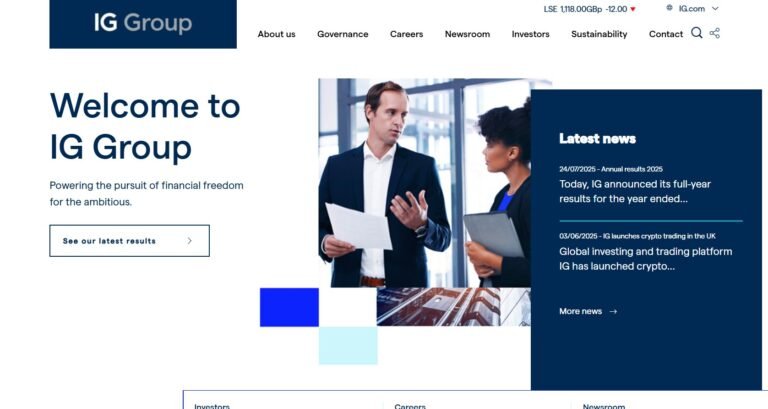Table of Contents
Introduction to IG Group
its offerings, and its legitimacy. IG Group claims to provide innovative crypto trading services,
attracting both beginners and experienced investors. However, concerns have been raised, with many users
asking: is IG Group a scam or a trustworthy platform?
Our goal is to provide clarity for two key groups: those who have already been scammed and are seeking answers,
and those considering depositing funds but want to confirm IG Group’s credibility.
This IG Group scam review uncovers all the warning signs you need to know.
IG Group: Regulation & Legal Status
One of the most critical steps in assessing any trading platform is verifying its regulatory status.
Upon investigation, there is no evidence that IG Group is regulated by any reputable financial authority
such as the U.S. SEC,
the UK’s FCA, or ASIC. Some crypto platforms falsely claim affiliation with these agencies to gain trust,
but IG Group offers no verifiable licensing information.
The lack of oversight means that users have zero protection against fraud, no dispute resolution mechanisms,
and no regulatory body to hold the platform accountable.
Learn how to spot a scam broker before it’s too late.
This absence of transparency raises serious concerns about whether IG Group is a scam.
Trading Conditions & Platform Analysis of IG Group
IG Group’s website lists several account types but fails to provide clear information about critical factors
such as spreads, fees, or order execution methods. The minimum deposit appears to be relatively low,
which is often a tactic used to lure unsuspecting traders. Additionally, the platform allegedly offers
high leverage, which can be risky for beginners and is typically restricted by regulated brokers.
While the platform claims to use advanced trading tools, there is no evidence of partnerships with
reputable liquidity providers or verification of STP/ECN execution.
Remember, having an advanced trading interface doesn’t guarantee a trustworthy broker.
What to check before signing up with a trading platform
should always include licensing and transparency.
These gaps make it harder to dismiss the idea that IG Group might be a fraud.
Reputation & User Reviews About IG Group
A look at TrustPilot reviews for IG Group
reveals a concerning pattern: many glowing testimonials seem generic and unverifiable,
while negative reviews point to issues with withdrawals, unresponsive support, and high-pressure tactics
from account managers. This blend of fake positivity and real user complaints is a red flag
for any potential investor.
According to traffic analysis tools like SimilarWeb, IG Group’s online presence is limited,
which could indicate that it’s relatively unknown in legitimate trading circles.
These reputation concerns should not be ignored when evaluating whether IG Group is a scam.
How to Test Whether IG Group Is a Scam
If you’re unsure about a trading platform like IG Group, here’s how you can test its legitimacy:
1. Check for regulation: Verify licenses with agencies like the FCA, ASIC, or CySEC.
Missing or vague license details are a huge red flag.
2. Read real user reviews: Look beyond polished testimonials and search for detailed
complaints on independent platforms such as Forex Peace Army.
3. Test the website and platform: Scam platforms often use poorly designed websites
and unfamiliar trading software.
4. Review withdrawal terms: Be wary if the platform only allows crypto withdrawals
or hides its payout policies.
5. Watch for false promises: No legitimate broker can guarantee profits or eliminate risks.
6. Try a demo account: Reputable brokers provide demo accounts to test their platform
without depositing real funds.
Final Verdict & Alternatives
Based on our findings, IG Group lacks transparency, regulation, and trustworthy user feedback,
making it a high-risk platform for cryptocurrency trading.
We recommend avoiding IG Group and instead considering regulated brokers that are overseen by
top-tier authorities.
If you’ve already lost money to platforms like this, report it immediately via
FTC’s fraud reporting portal.
Protect yourself by trading only with licensed platforms that provide clear terms,
robust client protection, and transparent operations.


